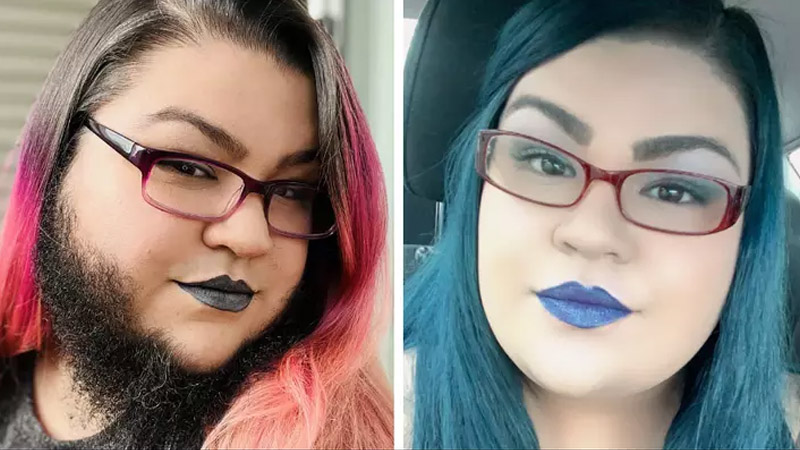
Coral Sanchez, a 29-year-old resident of Seattle, Washington, had been shaving her facial hair every day for 16 years before finally embracing her “beautiful” beard in March 2022. Coral first noticed her chin hair at the age of nine, and began shaving at 12 to avoid bullying. However, even after years of concealing her hirsutism-related facial hair, Coral struggled with homelessness and was forced to re-evaluate her relationship with shaving. With encouragement from her lover of almost four years, Coral decided to give up shaving and accept her natural appearance.
Coral’s story sheds light on the stigma surrounding hirsutism, a condition that affects millions of women worldwide. Hirsutism is characterized by excessive growth of coarse, dark hair on areas of the body where men typically grow hair, such as the face, chest, and back. The condition is often caused by hormonal imbalances, such as polycystic ovary syndrome (PCOS), which disrupts the function of the ovaries and results in the overproduction of androgens, or male hormones.
For Coral, living with hirsutism meant constantly hiding her facial hair from the world. She recalls feeling guilty at the age of nine, when her peers would make fun of her “bushy sideburns” and “act repulsed” by her. This led her to start shaving every day, which became a burden that she carried with her for over a decade. Coral would layer foundation over her face and avoid getting too close to people, all in an effort to conceal her beard.
But as Coral got older, hiding her facial hair became more difficult. She struggled to maintain complete coverage with makeup, and even kept her hirsutism a secret from her ex-boyfriend. It wasn’t until she was forced to live in her car without access to a shower or toilet that Coral started questioning why she was still shaving.
Living in her car was a turning point for Coral. She found that shaving was painful and time-consuming, and that she was becoming stubborn about it. But more than that, Coral began to see her facial hair in a new light. She realized that she had been shaving because she thought it was what she was “supposed to do,” not because she actually wanted to. And so, with the encouragement of her partner, Coral decided to let her beard grow.
For Coral, accepting her beard has been a journey of self-love and acceptance. She says that she now feels “really lovely” when she looks in the mirror, and wants to inspire others to embrace their own unique styles. Coral’s story challenges the notion that femininity and beauty are incompatible with facial hair, and serves as a reminder that there is no one “right” way to look or be.
Of course, not everyone has the same level of support or privilege as Coral. For many women with hirsutism, facial hair can be a source of shame, discrimination, and even abuse. Women with hirsutism often face prejudice and ostracism, and may be subjected to unwanted comments, stares, or even violence. Moreover, the social pressure to conform to conventional standards of beauty can make it difficult for women with hirsutism to feel confident or accepted.
That’s why it’s important to raise awareness about hirsutism and its impact on women’s lives. By sharing stories like Coral’s, we can challenge stereotypes and promote a more inclusive and accepting society. We can also advocate for better healthcare and support for women with hirsutism, including access to medical treatment, mental health resources, and community groups.
In the end, Coral’s story is about more than just facial hair. It’s about the power of self-love and acceptance.
